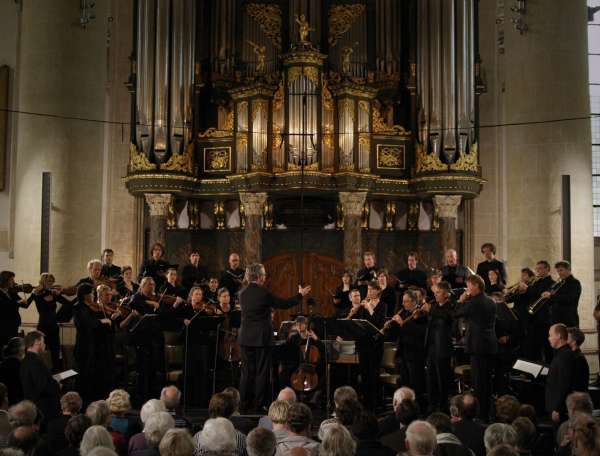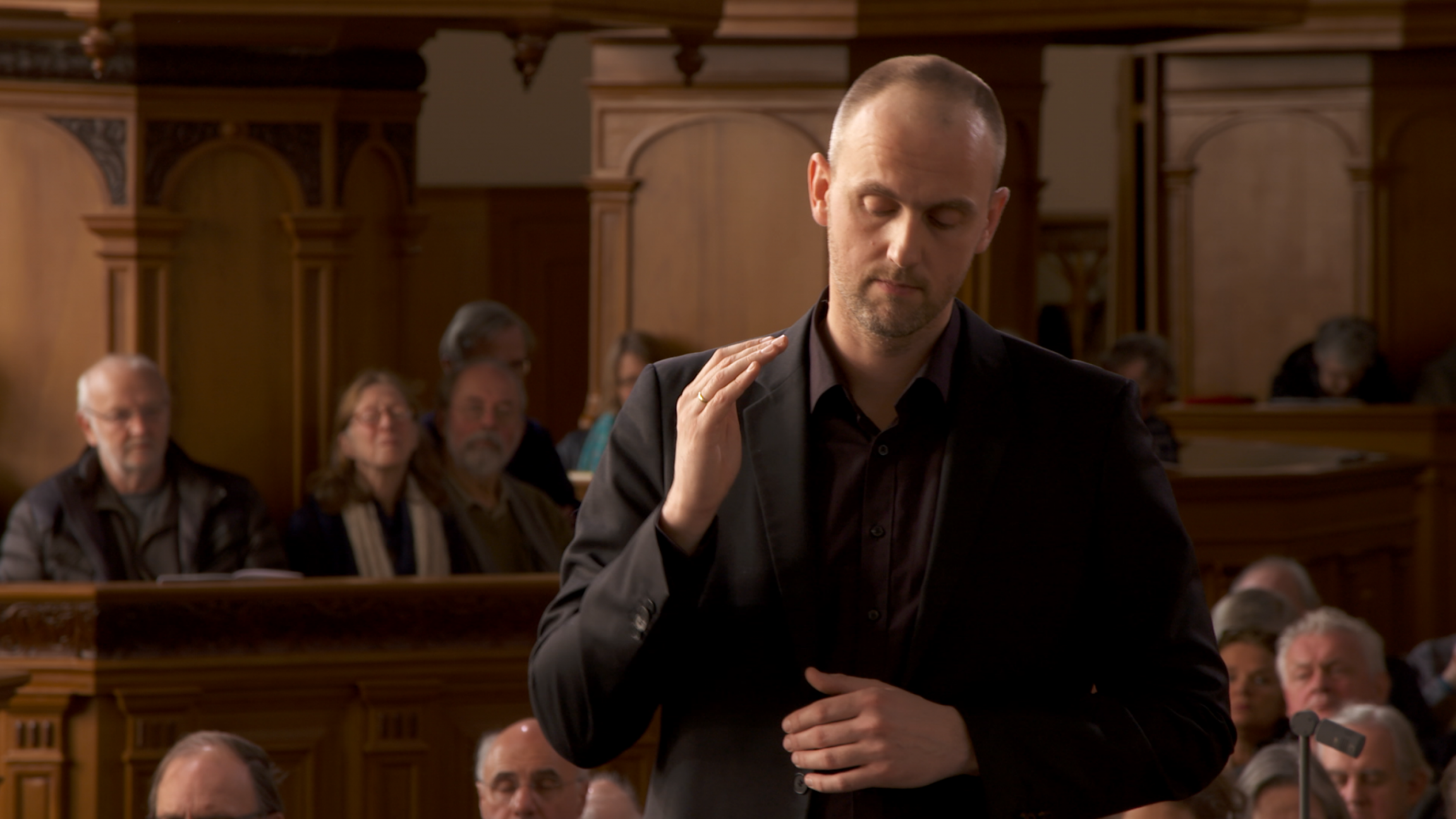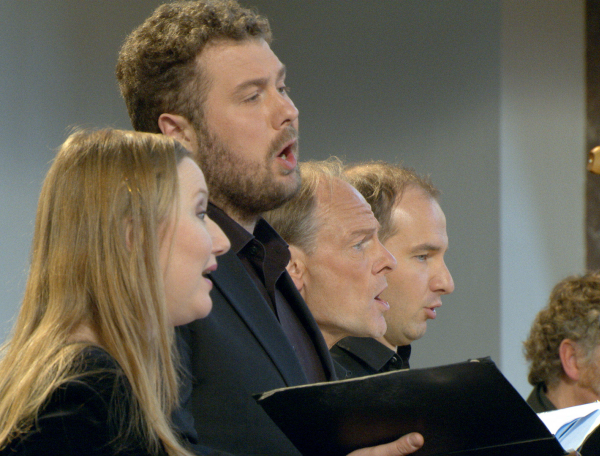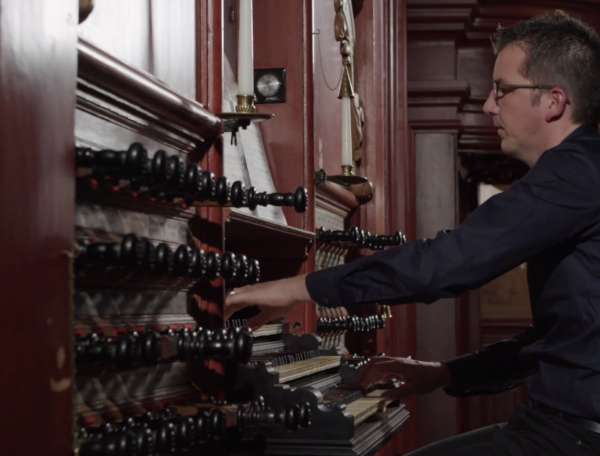

Lobe den Herren, den mächtigen König der Ehren
BWV 137 performed by the Netherlands Bach Society
conducted by Peter Dijkstra
Waalse Kerk, Amsterdam
Behind the music
Omnipresent chorale
Bach realised the dangers of uniformity
Bach set clear limits for himself in this piece. He used the complete unaltered text of a well-known hymn by Joachim Neander. The original hymn has five verses and the cantata has the same number of movements. There are no recitatives. Such a piece is also referred to as a chorale cantata.
It is only at the end that we hear the familiar version of the chorale, in a four-part setting with the melody in the upper part. In the first four movements, Bach has interwoven the material in various ways. As conductor Peter Dijkstra explains in his interview, he always takes a different aspect of the text as the basis for inspiring the music. In the opening chorus, it is the sopranos who sing the chorale melody. In the first aria, the alto sings the second strophe with ornamentation, while a solo violin darts around it with passage work. Bach later reworked this aria into one of his Schübler Choräles for organ, BWV 650. In the following aria (a duet for soprano and bass accompanied by a duet for two oboes), Bach used only the first notes of the chorale melody as the headmotif. The third aria has an expressively active singing part for the tenor, while the first trumpet or oboe plays the full chorale. The base key of A minor in this aria and the C major of the chorale melody create an intriguingly harmonic field of tension.
The differing ways in which Bach has incorporated the chorale into this cantata suggest that he realised the dangers of a certain uniformity. Although he could not get around using triple time, he did undertake a little round trip with the keys. From C major, he goes to G major, to E minor and to A minor, after which the cantata returns to C major.
- BWV
- 137
- Title
- Lobe den Herren, den mächtigen König der Ehren
- Genre
- cantatas
- Year
- 1725
- City
- Leipzig
- Text
- Joachim Neander
- Occasion
- Twelfth Sunday after Trinitatis, later Ratswahlkantate
- First performance
- 19 August 1725
- Special notes
- Possibly used as cantata for the inauguration of the town council
Extra videos
Vocal texts
Original
1. Chor
Lobe den Herren,
den mächtigen König der Ehren,
Meine geliebete Seele,
das ist mein Begehren.
Kommet zu Hauf,
Psalter und Harfen, wacht auf!
Lasset die Musicam hören!
2. Arie (Alt)
Lobe den Herren,
der alles so herrlich regieret,
der dich auf Adelers Fittichen sicher geführet,
der dich erhält,
wie es dir selber gefällt;
hast du nicht dieses verspüret?
3. Arie (Sopran, Bass)
Lobe den Herren,
der künstlich und fein dich bereitet,
der dir Gesundheit verliehen,
dich freundlich geleitet;
in wieviel Not
hat nicht der gnädige Gott
über dir Flügel gebreitet!
4. Arie (Tenor)
Lobe den Herren,
der deinen Stand
sichtbar gesegnet, der aus dem Himmel
mit Strömen der Liebe geregnet;
denke dran,
was der Allmächtige kann,
der dir mit Liebe begegnet.
5. Choral
Lobe den Herren,
was in mir ist, lobe den Namen!
Alles, was Odem hat,
lobe mit Abrahams Samen!
Er ist dein Licht,
Seele, vergiss es ja nicht;
Lobende, schliesse mit Amen!
Translation
1. Chorus
Praise the Lord,
the mighty King of honour,
my cherished soul,
that is my fervent desire.
Come in multitudes;
psalteries and harps, awake!
Let your music resound.
2. Aria
Praise the Lord,
who governs all things so gloriously,
who leads you so safely on His eagle’s wings,
who keeps you
as you would keep yourself;
have you not perceived these things?
3. Aria
Praise the Lord,
who has adorned you so exquisitely,
who has given you health,
and guides you kindly;
how often in your distress
has merciful God
not spread His wings over you!
4. Aria
Praise the Lord,
who has clearly
blessed your state,
who has rained down love from heaven;
consider
what the Almighty can do,
who treats you with love.
5. Chorale
Praise the Lord,
whatever is in me, praise His name!
Everything that has breath,
praise with Abraham’s seed!
He is your light,
O soul, forget it not;
ye who praise, end with Amen!
Credits
-
- Release date
- 1 December 2017
-
- Recording date
- 18 February 2017
-
- Location
- Waalse Kerk, Amsterdam
-
- Conductor
- Peter Dijkstra
-
- Soprano
- Miriam Feuersinger
-
- Alto
- Alex Potter
-
- Tenor
- Thomas Hobbs
-
- Bass
- Peter Kooij
-
- Ripieno soprano
- Lauren Armishaw, Marjon Strijk
-
- Ripieno alto
- Marine Fribourg, Barnabás Hegyi
-
- Ripieno tenor
- Yves Van Handenhove, João Moreira
-
- Ripieno bass
- Michiel Meijer, Pierre-Guy Le Gall White
-
- Violin 1
- Sayuri Yamagata, Annelies van der Vegt, Annabelle Ferdinand
-
- Violin 2
- Pieter Affourtit, Paulien Kostense, Lucia Giraudo
-
- Viola
- Staas Swierstra, Jan Willem Vis
-
- Cello
- Lucia Swarts, Richte van der Meer
-
- Double bass
- Robert Franenberg
-
- Oboe
- Martin Stadler, Peter Frankenberg
-
- Bassoon
- Benny Aghassi
-
- Trumpet
- Robert Vanryne, Fruzsina Hara, Mark Geelen
-
- Timpani
- Koen Plaetinck
-
- Organ
- Leo van Doeselaar
-
- Harpsichord
- Siebe Henstra
-
- Director and editor
- Bas Wielenga
-
- Music recording
- Guido Tichelman, Bastiaan Kuijt, Pim van der Lee
-
- Music edit and -mix
- Guido Tichelman
-
- Camera
- Jochem Timmerman, Thijs Struick, Merijn Vrieling, Charlotte Storm, Jildert Hof
-
- Lights
- Zen Bloot, Henry Rodgers, Patrick Galvin
-
- Assistant director
- Ferenc Soeteman
-
- Video engineer
- Vincent Nugteren, Jildert Hof
-
- Set technique
- Justin Mutsaers
-
- Data handling
- Jesper Blok
-
- Project manager nep
- Peter Ribbens
-
- Interview
- Onno van Ameijde, Marloes Biermans
-
- Producer concert
- Marco Meijdam, Imke Deters
-
- Producer film
- Jessie Verbrugh
Discover
Help us to complete All of Bach
There are still many recordings to be made before the whole of Bach’s oeuvre is online. And we can’t complete the task without the financial support of our patrons. Please help us to complete the musical heritage of Bach, by supporting us with a donation!

